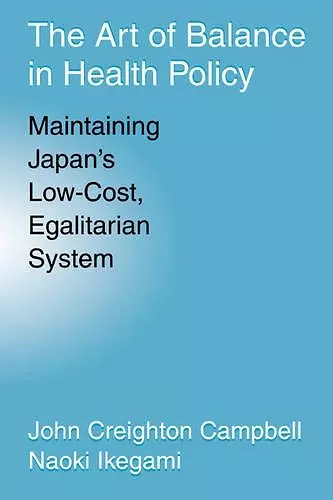The Art of Balance in Health Policy
Maintaining Japan's Low-Cost, Egalitarian System
John Creighton Campbell author Naoki Ikegami author
Format:Paperback
Publisher:Cambridge University Press
Published:12th Jun '08
Currently unavailable, and unfortunately no date known when it will be back
This paperback is available in another edition too:
- Hardback£58.00(9780521571227)

Describes the politics and economics of health care in Japan and their implications for the USA.
Compared to the rest of the world, Japan has a healthy population but pays relatively little for medical care. Taking a comparative perspective, the authors describe the politics of health care in Japan, the variety of providers, the universal health insurance system, and how the fee-schedule constrains costs.Compared to the rest of the world, Japan has a healthy population but pays relatively little for medical care. This book analyses how the health care works, and how it came into being. Taking a comparative perspective, the authors describe the politics of health care, the variety of providers, the universal health insurance system, and how the fee-schedule constrains costs at both the macro and micro levels. Special attention is paid to issues of quality and to the difficult problems of assuring adequate high-tech medicine and long-term care. Although the authors discuss the drawbacks to Japan's stringent cost-containment policy, they also keep in mind the possible implications for reform in the United States. Egalitarian values and a concern for 'balance' among constituents, the authors argue, are essential for cost containment as well as for access to health care.
"In this incisive, comprehensive political economy of the Japanese health care system, Campbell and Ikegami have brought clarity to a complex, often misunderstood subject. With even-handedness, the mechanisms of policy making and its implementation are systematically explicated, revealing an abiding fidelity to egalitarianism on the part of the Japanese. Written with lucidity, this is essential reading, not only for health economists and policy makers, but for everyone seeking to broaden their knowledge of Japanese culture." Margaret Lock, McGill University
"Clearly, anyone who is seriously interested in the political economy of health policy must read this book. Campbell and Ikegami give an insightful and accessible analysis of Japan's policy strategy in providing universal health care at an affordable level. The authors also opened the 'black box' on the political negotiations and institutional process which made the policy an economic success. A good lesson for the USA policy wonks." William C. Hsiao, Harvard School of Public Health
"Provides an account of Japanese health policy and the medical-care system from an American point of view. Draws lessons for the United States from the Japanese experience." Journal of Economic Literature
"Readers interested in a non-technical description of the Japanese system with tantalizing comparisons to the U.S. will find this book useful....between institutions in Japan and the U.S....the comparisons will have undeniable shock value for U.S. readers." Pacific Affairs
"Campbell and Ikegami provide a concise and informative description of how Japan's health system works, analyze how the system has achieved such exemplary results, and propose some specific lessons for the United States. This book is likely to become the standard text on Japan's health system and is timely for the global debate about how to reform health systems. The book's argument to explain Japan's successes in health policy, therefore, deserves serious consideration. Campbell and Ikegami have written an accessible and concise book about Japan's health policy, as a lens for viewing and critiquing the persistent problems in the American health-care system." Journal of Japanese Studies
ISBN: 9780521065054
Dimensions: 228mm x 151mm x 14mm
Weight: 356g
240 pages